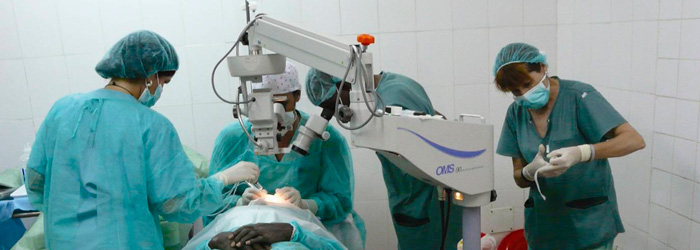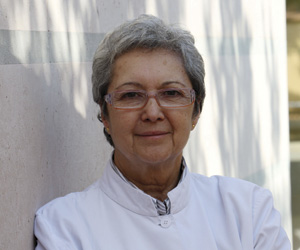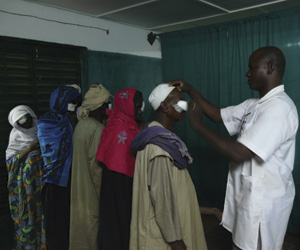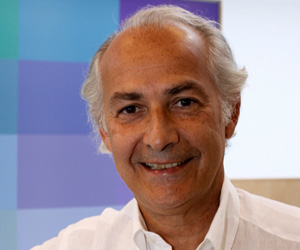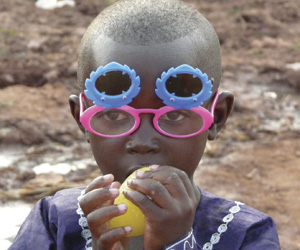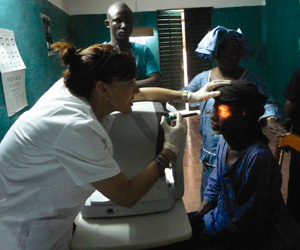Interview published in Consejo General de Colegios de Médicos and Sahara Medical.
How did you get involved in the project?
RA: Ever since I was a medical student, I’ve been interested in volunteer work. I’ve always believed that the vast majority of those who study medicine do so out of vocation and not monetary reward. Although I was interested, I wasn’t sure how I could be of any use without any experience. After several years of study and specialisation in ophthalmology, the opportunity to work with Eyes of the World presented itself while I was taking a master’s course on anterior segment at the IMO. Dr Isabel Nieto, my tutor and one of the founders of the Eyes of the Sahara project, suggested I get involved, and I’ll always be grateful for her sound advice and the opportunity she gave me to have such a unique experience.
JA: Basically, I felt the need to help people who don’t have the healthcare facilities that we in developed countries have. Also, this project is aimed at helping a population that lives as refugees, so they have even greater needs.
¿Cuál es la situación en la Región del Sáhara donde trabaja Ojos del mundo?
RA: It’s an Algerian desert region near the city of Tindouf, where about 30,000 Sahrawi refugees live. They are mainly women, children and old people and have been grouped into wilayahs since the war thirty years ago. The project is based in a refugee camp in the middle of the desert, where the people live in conditions of very poor hygiene and sanitation, and healthcare is provided by foreign aid organisations.
JA: The people are Sahrawis from Western Sahara, who were expelled from their land after the Franco era and now live in southern Algeria, a barren and impoverished area near the military town of Tindouf. The land was ceded to them by the Algerian government, but they live under political refugee status and rely entirely on humanitarian aid.
How does this affect people’s access to health services?
Well, as you can imagine, healthcare is limited, resources are scarce, the terrain and climatic conditions are very harsh and means of transport to get to the hospital are non-existent. All of this creates a situation in which the population has great difficulty accessing healthcare.
What does Eyes of the World do in the area?
RA: Our main mission is to eradicate avoidable blindness by pursuing the objectives of the VISION 2020 global initiative. In 2001, Eyes of the World set up the first of its medical/surgical missions in the refugee camps of Tindouf, and, today, there’s a regional eye care service supported by the Ministry of Health of the Sahrawi Arab Democratic Republic. The service is run by an optician, Hamudi Motjar, who has a team of local opticians who work in various centres in the wilayahs, some of which have workshops to make glasses in the field.
To promote the training of new local opticians, a school has been opened in Dakhla.
As well as Eyes of the World, there are other ophthalmic organisations working in the field that are also part of the eye care service. One of them is Medicus Mundi, run by Dr Pellicer, who has extensive experience working in the camps.
Our mission in the camps is to eradicate avoidable blindness, firstly, by providing the local population with quality eye care services, secondly, training local staff and, finally, but no less importantly, raising awareness among the people of the importance of eye health to prevent diseases.
JA: Mainly providing the local people with nursing and ophthalmic training, and then organising medical/surgical missions (about two per year) to perform surgery on those suffering from operable eye conditions.
The work also involves prevention of eye disorders and the monitoring of postoperative patients, firstly, by the ophthalmologists working in the field and, later, by trained Sahrawis.
What kind of work takes places when the surgical missions are not there?
Well, mainly projects relating to Sahrawi staff training, prevention of eye disorders, maintenance of ophthalmic facilities and assessment of potentially operable patients.
In your experience, what are the main causes of eye problems in the Sahara?
RA: Most of the causes of blindness in these countries are avoidable and have solutions. It sounds ridiculous, but many of these people are actually legally blind due to not having glasses, which is the case with childhood amblyopia, or having operable cataracts or infections like trachoma, which are preventable and treatable with antibiotics.
Between 2008 and 2010, a study was carried out to determine the prevalence of the most common eye disorders in the over 40 population. The two most common causes of significant visual impairment were refractive errors uncorrected by glasses and cataracts. More than 20% of cases had a cataract that caused a significant decrease in vision and restricted their everyday lives.
JA: Climate, a shortage of sunglasses, poor control of underlying conditions, like diabetes, and difficulty in getting access to healthcare.
Where are the region’s healthcare professionals located? What is the work protocol prior to travelling to the area in terms of training, diagnostic needs and equipment?
RA: The hospital where most of the operations are performed is in the town of Rabuni. There’s also a military hospital in Bol.la, but it is less accessible to the general population. The majority of health workers, doctors and nurses carry out their work in Rabuni. In each wilayah, there’s a medical clinic and an optician’s manned by two members of staff. The opticians are equipped with a basic eye examination instrument, called a slit lamp, and some have tonometry equipment to measure intraocular pressure. Some opticians, like those in El-Aaiún, Rabuni and Dakhla, have a workshop to make and fit glasses.
The problem in the desert is that the extreme environmental conditions and the sand often cause damage to the equipment, making it necessary for a technician to travel regularly to the locations to check and maintain it.
As the camps don’t have resident ophthalmologists, the opticians do a great job performing the dual role of measuring and correcting eyesight and, from an ophthalmic perspective, dealing with eye health problems and referring patients who require a specialist consultation or cataract surgery to the mission.
Also, for the last 2 years, the schools in the area have had trained nurses, who can detect vision problems in schoolchildren and correct them with glasses to prevent, for example, amblyopia, or lazy eye, developing into adulthood.
JA: I’m not sure, as I’ve only been there once, but I think there’s one trained Sahrawi ophthalmologist who travels several times a year to Rabuni to try to address the needs of the area to the best of his abilities. The remaining professionals involved in ophthalmic work are opticians and nurses and they’re doing an exceptional job.
In terms of the work protocol, Eyes of the Worldsent us a fact file about the history, culture, distribution of the camps or wilayahs, the place where we would be living during our stay, what work we would be doing, etc. There was also a meeting for the whole team to put together a work and organisation plan.
What does your work involve?
RA: As a medical/surgical mission, we travel there once a year for two weeks and carry out over 100 operations and 500 consultations. The team consists of an ophthalmologist, an optician and a technician.
During consultations, medication is also dispensed. Many cases of trachoma and glaucoma are detected and monitored. Patients who have cataracts and need surgery are registered and put on a waiting list for the current mission or the following one, organised by either Eyes of the World or Medicusmundi.
As I’m the project’s medical supervisor, which I’ve been since 2010, I’m also responsible for the postoperative monitoring of all patients after a mission has finished, including those from the previous year, so I usually stay on for longer. During the examinations, I have to check the patients’ vision and write a report that includes statistics about the mission, such as the number of cases in which vision was improved and the percentage of patients who experienced complications. This is the quality control aspect of our surgical work in the field.
JA: As an anaesthesiologist, I had to see all of the patients who were due to have surgery and take a short medical history, before deciding on the most appropriate anaesthesia according to the type of patient and surgery to be performed.
Complementary testing only involved checking blood sugar levels, which were often particularly high due to dietary habits, and an ECG, if general anaesthesia was to be used. As most cases involved cataracts, a regional anaesthesia, such as a retro/peribulbar block, was sufficient. General anaesthesia was only necessary in a few cases. The day after the operation, I would ask them a few questions to find out how they were before they were discharged.
What requirements and training do medical professionals need to have to get involved in this kind of project?
RA: In my opinion, there are two requirements: one is experience and the other is motivation.
Firstly, it is essential that the volunteer ophthalmologist has extensive experience in cataract surgery, as there are many highly complex cases that make surgery difficult, like very hard cataracts with poor pupil dilation and corneal opacities caused by exposure to the sun. The limited resources with which to perform operations are also particularly challenging, meaning that the skill of the surgeon is even more critical.
Secondly, it is also important to be motivated, because the working conditions are extremely harsh. The technical equipment we have to work with is very basic and requires the professional to be determined and patient in order not to get discouraged in certain situations, such as when there’s a power cut during an operation, because the hospital’s generator is overloaded, or the ultrasound equipment stops working or an instrument breaks. Something unexpected always happens during a mission, and you have to try and overcome it with good humour. This is why motivation and a good working environment are essential for the mission to be successful.
JA: You should know something about where you’re going, the conditions you’ll find there, and, above all, I think you have to do it with as much empathy as possible. Training has to be correct on a professional level, with the knowledge and skills necessary to do the job, but you also have to be emotionally and psychologically strong, as the resources and facilities are poor and the social dramas you hear about are terrible.
You have to work long hours, because of the short time you’re there, two weeks in my case, to do the best work possible. You have to do the work with a smile on your face, especially since the appreciation that your patients transmit to you is amazing.
How can you get this training? Is it necessary to develop training policies at university?
RA: I think that medical volunteer training could be provided at university, but experience in the field is essential.
JA: This training is what you make of it. We live in a society that has lost a lot of its values, where competitiveness, aggression and being better than the rest is actively promoted, even at university.
It’s difficult to find academic training that deals with psychological aspects, although this can be conveyed by a teacher on an individual basis.
I think that medicine is one of those professions in which it should be done most, but strangely enough, it is sometimes difficult to find a true vocation in medical practice. The very system in which we live has ensured that we are satisfied with our privileged salaries and only have to worry about ourselves, and that is very sad.
Do you think social and cultural issues have an impact on the health of the population? And is there any correlation between the role of women and health?
RA: Yes, absolutely, culture and gender are determining factors. In many countries, women’s access to healthcare is more limited than men’s, although operating on a cataract and restoring vision to a woman is more cost-effective according to Vision 2020’s studies. This situation of inequality was also observed in a gender study carried out by the Foundation in 2010.
JA: Of course, they do. As I mentioned earlier, the climate, dietary habits, malnutrition, lack of access to healthcare. I was particularly struck by the large amount of sugar they have every day, mainly in tea, which causes a high incidence of diabetes in the population, most of which is not known about, so it’s not monitored, and this results in a large number of illnesses.
Regarding women, fewer of them come to have surgery, probably for cultural or religious reasons, which obviously have to be taken into consideration.
Can you be more specific?
Sahrawi women are a fundamental pillar of the family structure, but there are still customs derived from a radical interpretation of Islam that ensure that their role in many respects is considered less important than that of men.
Are patients assessed or monitored after surgery? Can improvements be seen in health education from one year to the next?
RA: Yes, we have made many improvements in the monitoring of patients by organising check-ups for patients from the previous year. By doing so, we can identify postoperative patients who still have vision problems, because they need a laser to remove opacities from their intraocular lenses, such as the YAG laser, which we have in the field, or simply because they don’t have glasses, since they haven’t yet been to the optician’s.
Another major improvement that we’re very proud of was the opening of an optician’s school in Dakhla, which was promoted by our head of optometry, Sandra Barroso. The school provides training for new opticians to help meet the needs of the population and make them more self-sufficient.
Last year, I had the opportunity to visit the school and was surprised to see that a lot of women had signed up for the training, which is in contrast to the current staff of opticians, who are all men.
JA: As I said before, there’s short-term monitoring by the ophthalmologists, who travel to the medical missions and, later, by the Sahrawi opticians themselves, who have been specially trained and are very hardworking. The improvement in eye health is clear to see, but it is still very difficult to raise awareness of the importance of prevention among the population due to certain customs.
What have been the biggest organisational and personal challenges so far?
RA: The biggest challenge now is to deal with the economic situation and resulting social unrest in Spain in order to minimise its impact on humanitarian projects.
For example, previously, there used to be two or three missions every year, but this year, due to problems with the public funding of the Sahara project, the mission scheduled for October has had to be cancelled.
Then, there’s also the issue of security. Last year, three aid workers were kidnapped in Rabuni, an area which, up until then, was considered safe.
JA: For me, it was travelling there and doing things as well as possible. In the coming years, I’d like to go back with a mission and try to organise a training programme on basic anaesthesia skills for the local population.
What’s next for Eyes of the World and for you personally?
RA: Attempt to survive the economic crisis and find other sources of funding, as government support has been substantially cut. On a personal level, to further develop the Eyes of the Sahara project.
JA: Well, to be honest, I can’t answer that question very well, because I’m only a volunteer with one year’s experience, but I think the goal of any aid organisation is to eventually not be needed, in other words, every project is aimed at promoting self-sufficiency, training and providing the local population with useful tools to enable them to become independent and undertake the same projects in the future with similar results.
The fact that they are refugees makes the situation even more difficult, but it is a goal that should force you to work harder and excel every day to achieve it.
What lessons have you learnt?
RA: That humanitarian aid works best when local people and institutions are involved to ensure projects become sustainable. Without them, unilateral aid would disappear.
JA: Humanitarian work is rewarding, and you probably do help them, but what they give back to you is definitively much greater. One more thing: the less you have, the more generous you are and the less you need.
What would you request from the Foundation? What do you think their main priorities should be?
RA: Two things: firstly, specific training for staff who want to do volunteer work in the field and, secondly, more coordination between doctors who are interested in volunteering and projects that require volunteers. Although it may seem easy, we’ve had serious problems finding doctors for some missions.
Dr Rebeca Atienza, Bachelor of Medicine from the University of the Basque Country. Specialisation in ophthalmology from the University of Barcelona at Hospital Clinic and a Master’s in Anterior Segment from the Instituto de Microcirugía Ocular in Barcelona. Voluntary work: Eyes of the World NGO since 2007. Since 2010, Medical Supervisor for the Eyes of the Sahara Project.
Dr Jesús Alonso Cabello, Licenciado en Medicina por la Universidad de Sevilla en 2004. MIR Anestesiología y Reanimación en HU Doce de Octubre (Madrid) (2005 – 2009). Anaesthesiologist, Infanta Leonor Hospital (Madrid) (2009 – 2010). Anaesthesiologist, Can Misses Hospital (Ibiza) (2010 – present). Voluntary work: Eyes of the World NGO (2011), Sahara Project.
Eyes of the World
Eyes of the World is a non-profit organisation that helps visually impaired people without financial resources from developing countries to receive quality eye care through their local health services and create conditions to reduce the incidence of eye disorders. It also works towards raising public awareness in our society of deficiencies in basic healthcare in those regions.
The Foundation was founded in July 2001 by Rafael Ribó and Borja Corcóstegui. The idea came about after they had visited a number of Sahrawi refugee camps six months earlier to find out about the situation in the region. The poor healthcare conditions and the extent of visual impairment suffered by the local population alerted them to the need to create an organisation to help improve the situation.
Read the full text at the website of Consejo General de Colegios de Médicos and el blog de Sáhara Medical.
